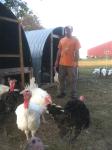COLUMBIA, Mo. – Some area families will give thanks for turkeys raised as part of University of Missouri student Jordan R. Dawdy’s thesis on community-supported agriculture (CSA).
The doctoral student in rural sociology started his road to Mizzou when he moved from a close-knit farming community in Tennessee that practiced sustainable agriculture. That experience and his love of animals inspired him to get his GED and enroll in college. He graduated magna cum laude as a McNair Scholar from Middle Tennessee State University with a degree in animal science. He then enrolled in the College of Food and Natural Resources at MU, one of the few universities in the country with a rural sociology department.
The 36-year-old Dawdy and his partner, John Doubek, live next door to Fred Martz’s 500-acre farm near Columbia. Martz taught ruminant nutrition and forage utilization at the university prior to retirement, and has allowed Dawdy and Doubek to use the farm to raise swine, broiler chickens and turkeys as a CSA project.
Community-supported agriculture began in the 1960s in Europe and in Japan, where it is called teikei. The first CSAs in the United States appeared around 1985. Participants are committed to growing healthy food and developing relationships between the farmer and consumers.
Rules vary from one CSA to another, but Dawdy’s has 30 members who pay $370 each and sign a contract for shares of beef, lamb, chicken, pork and turkeys.
Members of the group participate in workdays, potluck dinners and classes on cooking different cuts of meat. “It does widen your palette,” Dawdy said.
“Bounty or loss, the farmers and the consumers still have a long-lasting relationship,” he said, thus “putting a face on your food.”
At Dawdy’s CSA, “The People’s Republic of Delicious Foods,”newly hatched turkeys are delivered by mail to the farm, where they are fed with a plant-based feed that has no additives or antibiotics. The young turkeys are raised under heat lamps until they have enough feathers to weather the outside. They then go outside to an area fenced with solar-powered electric netting to protect them from predators. They sleep in huts and have a regimented feeding and watering schedule.
And while their demise is certain before Thanksgiving Day, Dawdy said, “They had a wonderful life while they were with us.”
Read more http://extension.missouri.edu/news/DisplayStory.aspx?N=1612





